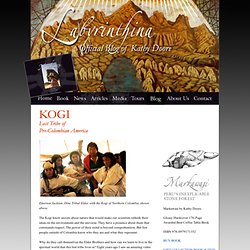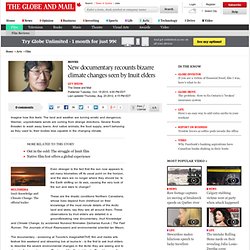

Supporting Indigenous Peoples, Protecting the Amazon. No Birds Sing in Monoculture "Forests" MONTEVIDEO, Sep 24, 2011 (IPS) - Artificial single-species forests are expanding fast in countries of the developing South, fuelled by low production costs and incentives from governments, and causing severe social and environmental impacts, warned experts from around the world who met this week in the Uruguayan capital. The so-called "green deserts" are encroaching on the fertile soil of South America and other regions, with the proliferation of plantations of fast-growing and high water-demanding trees to be used to produce pulp and paper, and for other industrial uses, displacing local communities and threatening native ecosystems.
EcoAlert: Newly Observed Tribe in Heart of the Amazon (VIDEO) Video of a never before discovered tribe, believed to be Panoa Indians. discovered in Brazil's Amazon jungle has been released, bringing them to life.

The tribe has been monitored from a distance by Brazil’s National Indian Foundation, a government agency charged with handling the nation’s indigenous communities. Many of the world’s 100 or so indigineous tribes live in the Amazon. Until 1987, it was government policy to contact such people. But contact is fraught with potential problems, mainly disease due to their isolation from the mainstream world and its pathogens. Brazilian government policy is now to watch from afar, and attempt to protect uncontacted tribes from intrusion and exploitation. As has happened elsewhere in the vast Amazon basin, tribes usually live in resource-rich areas threatened by logging, mining and other development.
Amazon Opportunity: Brazil Doesn't Count on Carbon Market. This story is part of a special series that explores energy issues.

For more, visit The Great Energy Challenge. Brazilian businessman Roberto Waack has told potential investors around the world about his sustainable forestry firm, explaining how it sells certified wood, conserves water, and protects forests. But at meeting after meeting, he gets the same question: Is there money to be made from trees absorbing fossil fuel emissions? Waack says he has watched a wave of speculators edge in on Brazil, eyeing the world’s biggest tropical-forest country as the ideal place for polluters to pay off the wrongs they’ve done to the atmosphere. By paying to preserve a piece of the Amazon, they hope to “offset” the carbon dioxide they’ve released by burning coal, oil, and natural gas in factories and power plants across North America, Europe, and Japan.
Brazil’s sprawling forests are indeed an important carbon “sink,” naturally pulling carbon dioxide from the air. Avoid US route: Indian minister says American way is 'recipe for disaster' The Indian environment minister, Jairam Ramesh, has attacked the growing Indian taste for the American lifestyle, which he called the "most unsustainable in the world today".

In an interview with the Guardian, Ramesh, who will travel this weekend to Cancun in Mexico for the next round of global climate negotiations, said the world was paying the price for "the US model of development" which, he said, India and China have embraced. "It is a paradigm fraught with grave risks. I shudder to think what will happen if we [in India] follow the suburban model of urbanisation," said Ramesh, who has established a reputation as one of the most proactive Indian environment ministers for many years.
"You can't blame the Americans. Lost Tribe of Pre-Colombian America. Emerson Jackson, Dine Tribal Elder, with the Kogi of Northern Colombia, shown above.

The Kogi know secrets about nature that would make our scientists rethink their ideas on the environment and the universe. They have a presence about them that commands respect. The power of their mind is beyond comprehension. But few people outside of Colombia know who they are and what they represent. Why do they call themselves the Elder Brothers and how can we learn to live in the spiritual world that this lost tribe lives in? New documentary recounts bizarre climate changes seen by Inuit elders. Imagine how this feels: The land and weather are turning erratic and dangerous.

Warmer, unpredictable winds are coming from strange directions. Severe floods threaten to wash away towns. Vedanta victory masks growing threats to indigenous people globally. The Indian government’s recent decision to ban Vedanta Resources from mining on sacred land belonging to an indigenous community came after months of pressure from campaign groups, extensive media coverage and unprecedented levels of opposition from a variety of quarters.

Despite the victory for the Dongaria Kondh people, an alarming number of other indigenous communities across the world are now under serious threat from mining, logging, cattle ranching and other industrial activities, The Ecologist has established. Campaigners say that greater media coverage of these often unreported case studies could boost the chances of indigenous people's successfully defending their land from enchroachment. Earlier this month the British owned Vedanta’s plans to mine for bauxite in a remote part of eastern India were halted, but not without a fight.
Bushmen of Botswana denied water for diamonds Dam building on a global scale ‘Uncontacted tribes’ at risk Why is it happening?